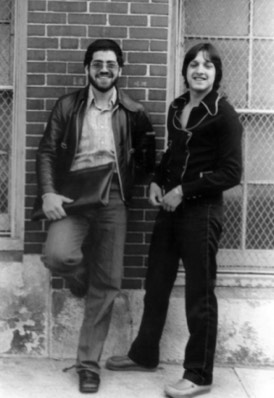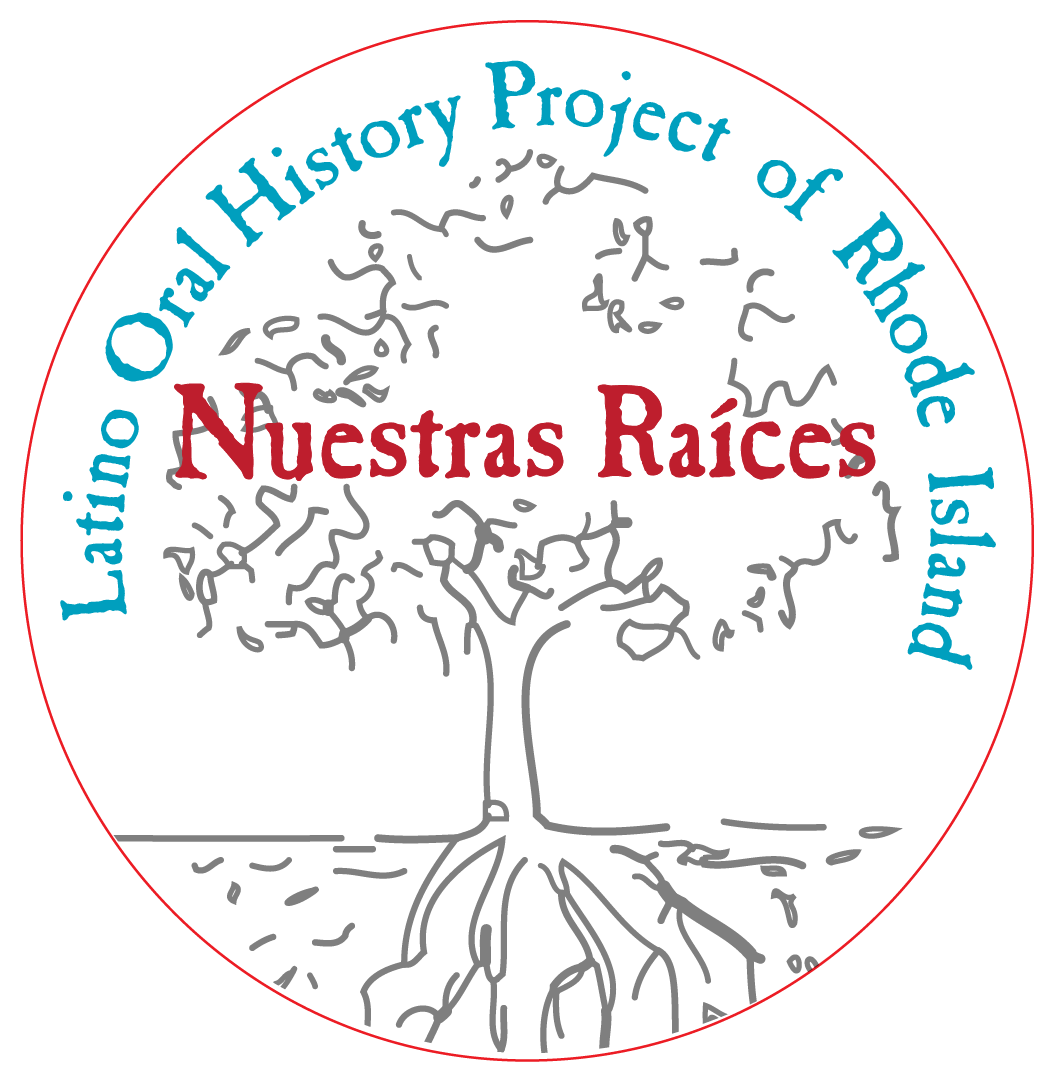Photo Above: The first Latin American Student Organization (LASO) at Rhode Island College was formed in 1972 by brothers Roberto and José González
Early Community Organizing

Roberto (pictured above-left) as a VISTA Volunteer and Coordinator of Upward Bound at Rhode Island College, with Emilio Matos.
And the person would come and say, for example: “Well, my child, I can’t get him into the school,” and the group would, right away, have a discussion, and come up with some kind of an action plan. It was all action-orientated: you identify the problem, and solve it immediately.
Then there was another group meeting in Providence [in 1970], and they eventually got some funding and started the Latin American Community Center, which was located over on Harvard Street. The group hired a director and they had a physical office where people could come and get some help. And the way they worked is, that they would try to get government agencies to have a representative there at certain hours of the week. So if, for example, somebody came in and said, “Hey, look, I’m having trouble finding a job,” they would say, “Well, come back on Thursday in the afternoon, the unemployment representative for the state will be here.” Or if people had a problem with social services, there’d be a social service person available to help. And that was the way that organization worked.
I was stationed there to help with community organizing and things like that: getting the word out, trying to do whatever I could and whatever was needed. But, eventually the funding dried up and the Latin American Community Center closed.
After that, we formed the Coalition of Hispanic Organizations, or as we called it “Coalición.” We had representatives from Pawtucket, Central Falls area, and also different groups representing different interests. For example, there were groups that just were interested in doing sports programs for the community—the soccer leagues, the baseball leagues, for example. There were groups that just wanted to do beauty pageants. There were groups that just wanted to do a parade.
Then there were individuals who wanted to get into the political end of things, which is what I was interested in: community and political issues. So under one umbrella, we managed to bring everyone together, mainly for the purposes of getting some funding. And then we got a location over on Broad Street, a storefront. That was the first office of Coalición and it lasted for three or four years.
What happened [when some of the thriving organizations run by Hispanics closed], was what naturally happens when funders don’t understand a community and attempt to dictate what they believe is best for them: things just fell apart.
So that’s how some of the organizations that still exist today were created. Because I remember, from that came Progreso Latino. And the Hispanic Social Services Committee (HSSC) went off on its own, and then later became HSSA CHisPA. And other groups were formed, like Casa Puerto Rico, too. Yes, so the individual people that were involved early on with the Coalition stayed involved in other efforts and endeavors.
So all that movement among Hispanics goes up to right about 1979. And back then, one of the biggest concerns was getting representation at the government level: getting people to get into important jobs, getting people on commissions, getting people elected. So that was a big, big spinoff from the Coalition. And in fact, a lot of the people that were involved with the Coalition ended up getting politically involved in one way or another.
Political action groups formed, such as the Hispanic Political Action Committee, and there was the Puerto Rican Political Action Committee: Jorgie Sánchez, Tito Matos, Lydia Rivera and others. I remember the group eventually went from getting people out to vote, and getting involved in candidates’ campaigns, to actually doing more of the: “Well, we wanna meet with all the candidates, and get their positions, and tell them what we need,” and such. And towards its later years, that’s what was happening. They were having meetings where they were bringing the candidates and having community forums. And I remember going to some of these forums where they would get a dozen cases of beer to attract people, get some food out, and then they would invite the candidates to come and talk to the group. The room would be packed with Hispanics and the candidates took notice.
So all that movement among Hispanics goes up to right about 1979. And back then, one of the biggest concerns was getting representation at the government level: getting people to get into important jobs, getting people on commissions, getting people elected. So that was a big, big spinoff from the Coalition. And in fact, a lot of the people that were involved with the Coalition ended up getting politically involved in one way or another.
Political action groups formed, such as the Hispanic Political Action Committee, and there was the Puerto Rican Political Action Committee: Jorgie Sánchez, Tito Matos, Lydia Rivera and others. I remember the group eventually went from getting people out to vote, and getting involved in candidates’ campaigns, to actually doing more of the: “Well, we wanna meet with all the candidates, and get their positions, and tell them what we need,” and such. And towards its later years, that’s what was happening. They were having meetings where they were bringing the candidates and having community forums. And I remember going to some of these forums where they would get a dozen cases of beer to attract people, get some food out, and then they would invite the candidates to come and talk to the group. The room would be packed with Hispanics and the candidates took notice.

